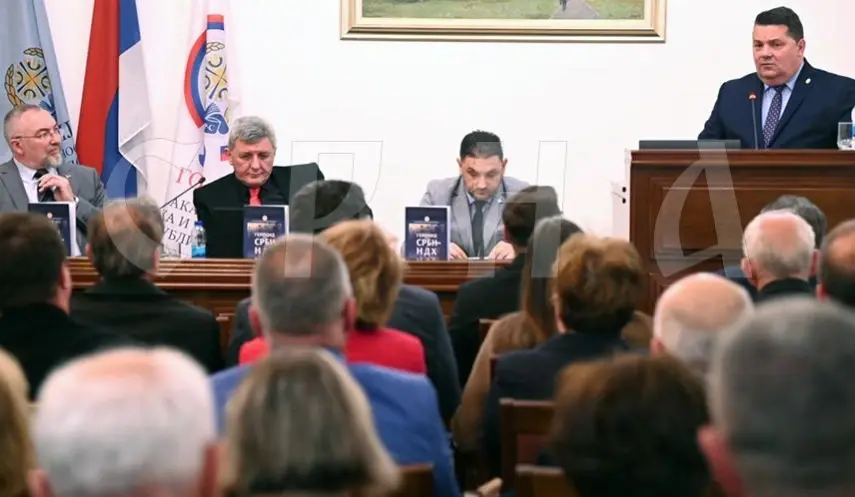STEVANDIĆ: CULTURE OF REMEMBRANCE OF SERB SUFFERING MUST BE PASSED ON TO YOUNGER GENERATIONS
Republika Srpska - historical memory
05/12/2025
20:21

BANJA LUKA, MAY 12 /SRNA/ – The Speaker of the National Assembly of Republika Srpska, Nenad Stevandić, stated today that the culture of remembrance of Serb suffering and execution sites must be passed on to younger generations so that such genocidal intentions against Serbs are never repeated.
"If we ourselves do not show awareness to pass on this kind of remembrance to the younger generations, the genocide against Serbs will go unpunished. We will not allow that," Stevandić emphasized at the promotion of a book and thematic discussion titled "Genocide Against Serbs in the NDH – A People That Wasn't Supposed to Exist", held this evening at the Academy of Sciences and Arts of Republika Srpska in Banja Luka.
He told reporters that Serbs, especially today, must demonstrate strength and determination to prevent anyone from daring to repeat the crimes and genocide committed against the Serb people.
"Republika Srpska is a guarantee of that memory of crimes and execution sites, as symbolized by Donja Gradina, which ‘looks upon’ Jasenovac," Stevandić noted.
He warned that the disappearance of Republika Srpska would also mean the disappearance of much of that memory.
"Republika Srpska is the essence of the 21st century for our people – its only gain and the only guarantee of a culture of remembrance and protection from future genocides," Stevandić added.
The author of the book, Dušan Pavlović, stated that Republika Srpska was established as a response to attempts to complete the genocidal projects of World War II.
"The creation of Republika Srpska was the Serb ‘no’ to a new genocide," said Pavlović, who is also the director of the Center for Socio-Political Research of Republika Srpska.
Aleksandar Mitić, a research associate at the Belgrade Institute of International Politics and Economics, said that the book addresses the systematic state-sponsored genocide against Serbs and should serve as a warning.
He added that historical revisionism and the relativization of the genocide of Serbs in the NDH will not be allowed.
"The goal is to clearly define, both legally, politically, and historically, what the genocide against Serbs in the NDH was," Mitić said.
Professor Predrag Lozo emphasized that Serbs must learn lessons from their suffering under the NDH.
"It’s important to understand that Republika Srpska emerged from the desire to ensure such events never happen again," Lozo said, adding that this knowledge must be passed on to the youngest generations.
Professor Draga Mastilović stressed the need to build a culture of remembrance among Serbs, as it serves as a defense against the repetition of genocide.
Marking 80 years since the genocide against Serbs in the NDH, Victory Day over Nazism and Fascism, and the Day of the Army of Republika Srpska, the Center for Socio-Political Research of Republika Srpska organized the promotion and discussion of the book "Genocide Against Serbs in the NDH – A People That Wasn't Supposed to Exist."

SERBS IN TEARS AND FEAR OVER OWNERSHIP OF ORTHODOX CEMETERIES AND CHURCHES

CVIJANOVIĆ DEMANDS ACCOUNTABILITY FOR SHAMEFUL CONCERT IN ŠIROKI BRIJEG

OSTOJIĆ URGES BiH AND EU TO ACT OVER GLORIFICATION OF FASCIST IDEOLOGIES





